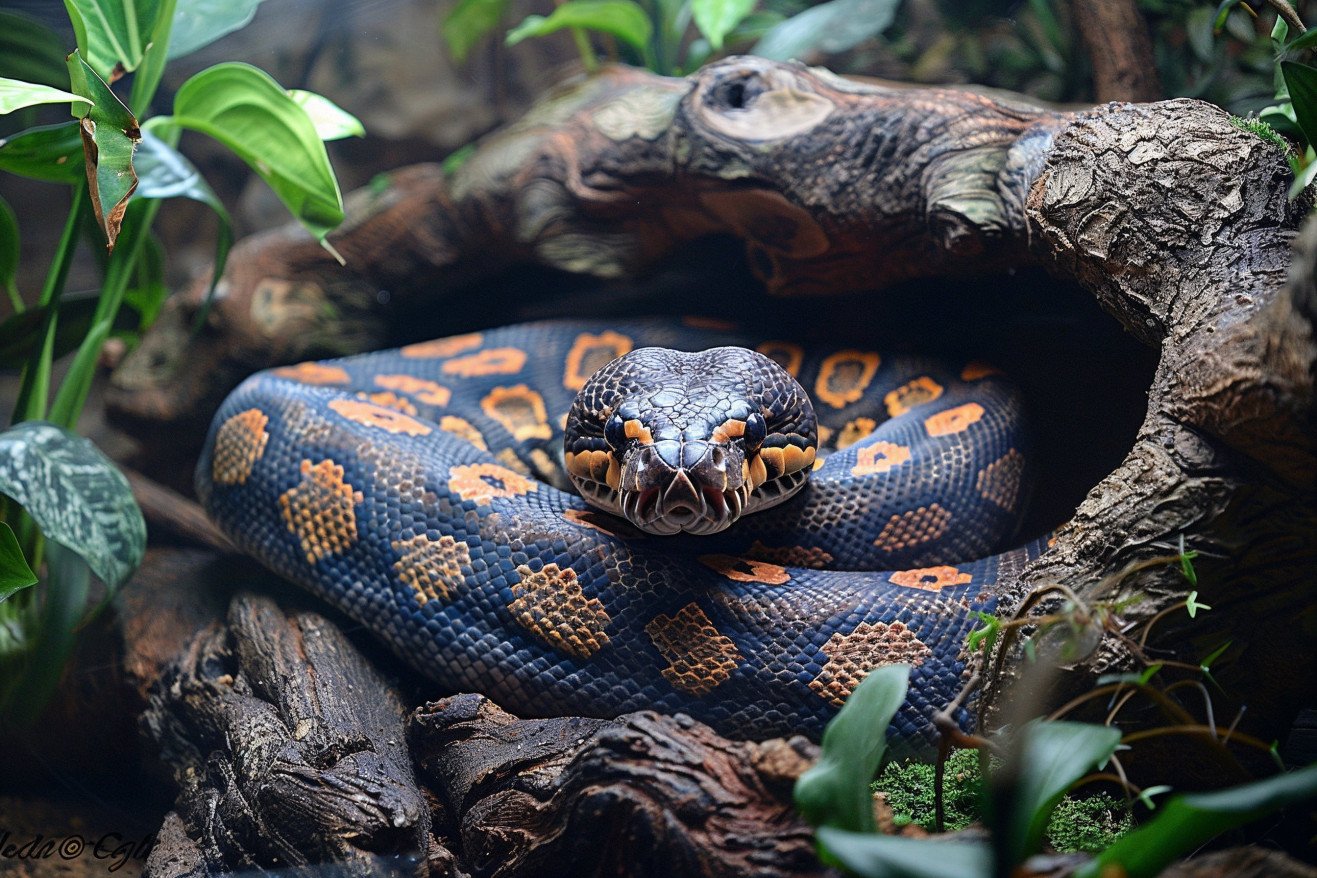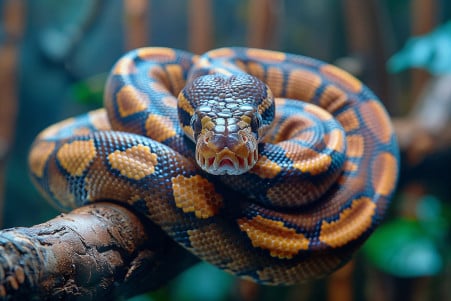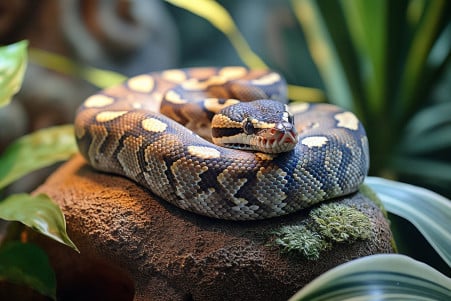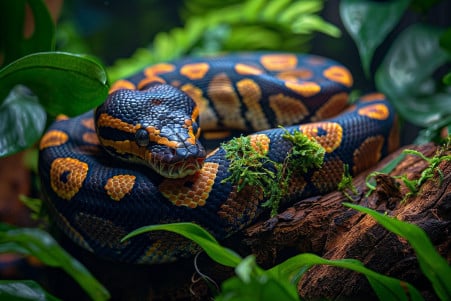Should You Get a Ball Python? Here's Everything You Need to Know
10 May 2024 • Updated 10 May 2024

If you're thinking about getting a ball python, you'll need to know the good and the bad – from their temperament to the kind of tank they need and how often they need to be fed. Ball pythons can be great pets for the right people. These non-venomous snakes are relatively small, generally friendly, and can be fed every few weeks with pre-killed prey like mice or rats. But they also need a tank with the right temperature, humidity, and hiding spots.
In this evidence-based overview of ball pythons as pets, we'll cover research and expert opinions on their personality, tank needs, potential drawbacks, and which types of people they're best suited for. By the end, you'll have a complete picture of whether this scaly friend is right for you based on your experience level and living situation. Whether you've had snakes before or are thinking about getting your first reptile, this comprehensive guide to ball python care will help you make the best choice.
Are ball pythons good pets?
Ball Python Behavior and Temperament
Ball pythons are known for their docile, shy temperament, especially if they are handled often from a young age. As ReptiFiles points out, they are named for their tendency to roll themselves into a tight ball when they feel threatened, which is a defensive, not aggressive, behavior. However, while they are not typically aggressive, if they are stressed or handled roughly, they can also exhibit behaviors like hissing, striking, or musking, according to Terrarium Quest.
This is why it's important to make sure that the snake is socialized and that the owner knows how to handle them properly. Terrarium Quest notes that handling sessions should be short and infrequent to prevent the snake from becoming stressed. Ball pythons are crepuscular, which means they are most active at dawn and dusk, and they are also known to be both terrestrial and semi-arboreal, according to ReptiFiles.
Knowing these things about their behavior and temperament can help owners set up an environment that will be most beneficial to the ball python. With that said, they can be great pets for those who are willing to meet their needs. Their sweet temperament makes them a popular choice, but that doesn't mean that their care should be taken any less seriously when it comes to making sure that they are healthy and happy.
Habitat and Environmental Needs of Ball Pythons
Ball pythons need a specific environment to be healthy and happy. According to PetHelpful, the enclosure should have a thermal gradient, with a warm basking spot of about 90°F and cooler areas in the low 80s. ReptiFiles suggests keeping humidity levels at 55-65% and raising it to 60-70% during shedding.
The right hides, substrate, and other items in the enclosure are also important for the snake's mental and physical health. Riverview Park and Zoo explains that the size of the enclosure should be based on the length of the snake, with most adults needing a 40-60 gallon tank. By making sure that the snake's habitat meets these requirements, owners can make sure that their ball python is happy and healthy.
When the right temperature, humidity, and environmental requirements are met, ball pythons can be healthy pets. However, it's important to make sure that these needs are met before bringing a ball python home.
Diet and Nutrition of Ball Pythons
Ball pythons are meat-eating animals that eat pre-killed or frozen-thawed rodents, including mice and rats. Zen Habitats notes that the frequency and size of meals will depend on the snake's age and size, and younger snakes will need to eat more often. It's also important to make sure that the prey is the right size, and the prey's diameter should be 1-1.25 times the diameter of the snake's body, according to WebMD.
Ball pythons can be picky eaters and may not eat for a variety of reasons, including environmental factors, shedding, and stress, says The Spruce Pets. There are several feeding tricks, including using tongs and feeding containers, that can be used to help entice a ball python to eat. However, as long as owners understand their dietary needs and make sure they are feeding them the right prey, they can make sure their ball python is getting the nutrition it needs to be healthy.
Of course, while maintaining a healthy diet and feeding schedule is important for ensuring the long-term health and happiness of these animals, owners will also need to be ready to deal with other health issues and care for their pets in other ways.
Health Concerns and Handling Tips
Ball pythons are prone to a number of health problems, including respiratory infections, mouth rot, and parasites. VCA Animal Hospitals notes that common issues include infectious stomatitis (mouth rot), intestinal and skin parasites, skin infections, respiratory disease, septicemia, and viral diseases like inclusion body disease. Proper habitat conditions, cleanliness, and regular veterinary care are important to keep the snake healthy, as pointed out by All Creatures Veterinary Hospital.
It's also important to make sure that handling is limited at certain times, like after the snake has eaten or when it's shedding or sick, according to Terrarium Quest. It's also important to make sure that handling is done correctly, which includes making sure that the snake is fully supported and that no sudden movements are made. In addition, it's important to make sure that you can recognize signs of stress or aggression, which can include hissing or striking, and that you know how to respond to them, according to Terrarium Quest. By learning about and dealing with potential health issues, owners can make sure that their ball python is healthy and have a good relationship with their pet reptile.
Lifespan, Legal Considerations, and Potential Challenges
Ball pythons can live for quite a long time, with captive ball pythons living up to 30-40 years with good care, according to XYZReptile.com. In the wild, ball pythons live for a much shorter time, averaging about 10 years due to predators and other environmental factors, according to the Riverview Park and Zoo.
There may be state or local permits or licenses required to own a ball python, and the laws can vary greatly by location, according to The Spruce Pets. The Reptile Rescue Center lists potential challenges of owning a ball python as making sure they have the right enclosure, maintaining the right temperature and humidity, and dealing with feeding problems.
Responsible ownership also includes looking into the legal requirements and making sure you're ready for the long-term commitment and have access to a vet who is experienced in treating reptiles. Understanding the lifespan, legal considerations, and potential challenges can help potential owners decide if a ball python is the right pet for them.
Ball pythons are native to a wide range of habitats in sub-Saharan West Africa, including savannas, woodlands, grasslands, and even human-disturbed areas. PetHelpful explains that they are often found within 50 meters of human habitation and can also be found in bushy and dryland rainforest patches, as well as occasionally in flooded habitats.
Ball pythons are the most commercially traded African species listed under CITES, with more than 1.6 million live animals exported since 1978, according to the CITES Trade Database. Although they have been successfully bred in captivity, the demand for morphs has led to an increase in the exportation of wild ball pythons, which is a concern for their wild populations.
As the Lehigh Valley Zoo warns, buying exotic pets can inadvertently support the illegal pet trade. It's important to make sure you're legally allowed to own a pet before getting one and to make sure you can provide the necessary care for the animal over the long term. This includes making sure you have access to a vet who can care for the animal. It's also important to note that releasing exotic pets into the wild is illegal and harmful to the animal, as they are unlikely to be able to fend for themselves.
Conclusion: Weighing the Pros and Cons of Ball Python Ownership
Ball pythons can be great pets for people who are experienced with exotic animals or who are willing to put in the time and effort to learn how to care for them properly. Their size and temperament make them appealing pets, but it's important to make sure you can meet their specific housing, dietary, and other needs. This can include making sure you have the space to house them properly, that you can maintain the right temperature and humidity levels, and that you can handle any health or feeding issues that may arise.
It's also important to make sure you're legally allowed to own a pet before getting one and to make sure you can provide the necessary care for the animal over the long term. This includes making sure you have access to a vet who can care for the animal. Ultimately, it's important to make sure you can meet a ball python's needs before deciding to bring one into your home.


